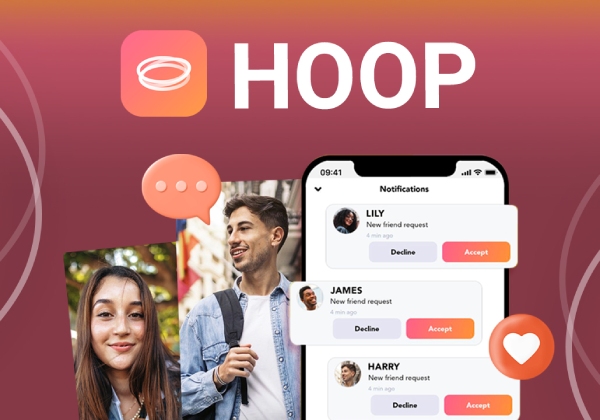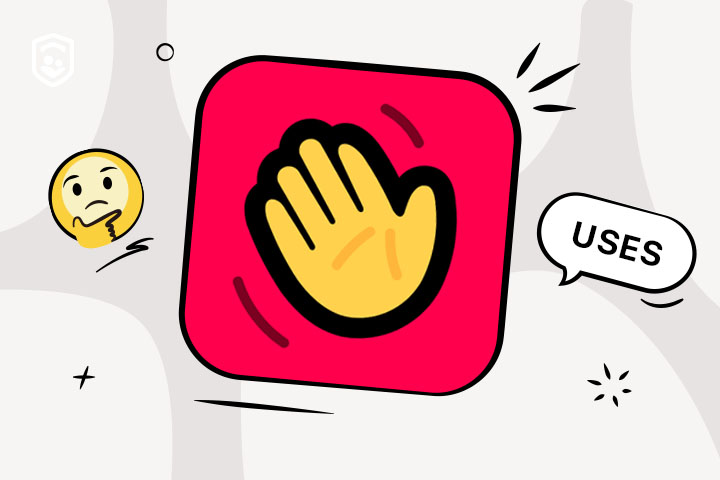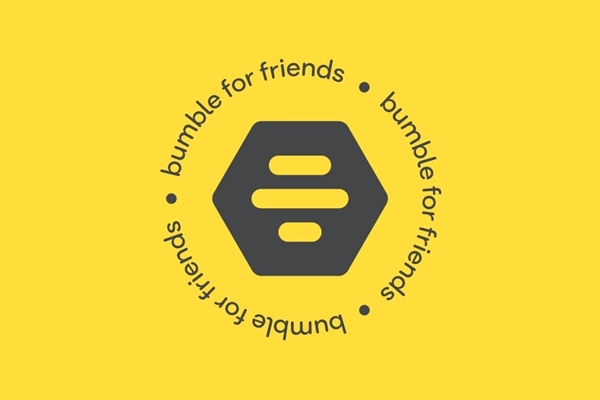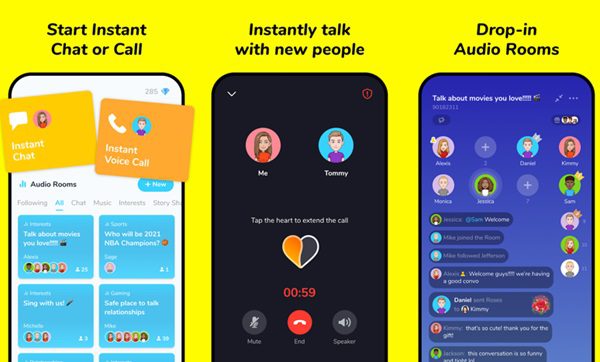Online sources have made it easy for teens to add friends and expand their social circle. While this may be a great way for kids to make meaningful social connections, it can also raise many red flags with parents regarding whether or not they are safe. The goal of this blog is to give parents an idea about popular social apps. By understanding these apps, parents can help direct their teens toward a healthy and safe online experience. So, if you’re worried about your kid’s interest in apps for teens to make friends, the following details will help clear up your mind.
8 Apps for teens to make friends: Parents should notice
There are many social apps to choose from, and it may seem impossible for parents to keep up with them. But still, it is necessary to stay in touch with what your teenagers are doing online and who they are interacting with. Following are some apps that today’s teens use to make friends and acquaintances online:
1. Hoop



Hoop is a Snapchat accessory that teens use to swipe through profiles, trying to meet new people. It works like Tinder. If users find each other interesting, they can send a request to connect on Snapchat. Due to its seamless integration with Snapchat & user-friendliness, it appeals to its teenage users. It is quite easy to set up and capitalizes on the existing Snapchat audience.
- Features you’ll get: Swipe profiles, Snap integrated photo sharing.
- Age rating: 13+
- Popular because it is easy to use, capitalizes on the existing Snapchat audience, and is visually focused.
2. Yubo



Yubo is yet another app that has been referred to as the “Tinder for Teens.” With this app, users can swipe on profiles, join chat rooms, and make new friends! The idea behind it is to provide a social platform where like-minded teenagers can interact with each other and share what they are passionate about. It offers live streaming, group video chats, and swipes to find new friends.
- Features you’ll get: Live streaming, group video chat, and swipe to find friends.
- Age rating: 13+
- Popular because it has Interactive live streams, chat-first engagement, a sense of community.
3. Houseparty



Houseparty, as the name suggests, is an online party app. T video chat platform that lets teens connect with their friends and teenage celebrities. It is acknowledged for its casual interactions, making it a popular choice amongst teens. It provides group minigames, live notifications, and regular-party video calls.
- Features you’ll get: Video chats, notifications of friends coming online, games.
- Age rating: 13+
- Popular because it has good group video games and regular party videos called social notification features.
4. Wink



Wink is a social app that offers features like swiping profiles, in-app chatting, and moderation tools. It has an additional layer of safety as its users need to verify their phone number, and it employs content moderation. Teens can swipe through profiles and chat with each other in complete privacy. It is easy for new people as well because they can easily manage their accounts with its simple UI.
- Features you’ll get: Swiping profiles, chat within the app, and phone number verification.
- Age rating: 13+
- Popular because of its safety features, easy to manage accounts from new people as well as moderation tools.
5. Bumble BFF



Bumble BFF is a mode of Bumble which is a dating app. It is quite popular among teens. It only requires its users to upload four photos to get started. Teens can swipe profiles and spend time reading what others wrote about themselves. That’s how they know if they have something in common and if they have any mutual interests, they can foster an online relationship.
- Features you’ll get: Swipe and connect with interest-based profiles.
- Age rating: 18+ (frequently used by older teenagers)
- Popular because it has Nearly 1M profiles, unique match-making choices, and lots of search templates.
6. LMK



LMK is a social app to make new friends in a variety of ways! Teens can join a community where they can chat, talk, and hang out with people who share similar interests. It offers features like instant chat, drop-in audio, swipes, and building profiles. Through drop-in audio, teens can talk to a group of people and share their thoughts. LMK is also a Snapchat accessory.
- Features you’ll get: Group chat, forums, Snapchat integration.
- Age rating: 13+
- Popular because of its threads and many different discussions, and it can be integrated into Snapchat.
7. Meetup



Meetup allows members to congregate off-screen based on a shared interest. While it mostly serves adults, older teens can find groups and events that match their interests. It offers group plans, discussions, and as the name suggests, meetups. It is best known for networking, interest groups, and event discovery.
- Features you’ll get: Plan groups, discussions, make any kind of Meetups.
- Age rating: 18+
- Popular because of extensive networking, interest groups of a variety of kinds, and event discovery.
8. Friended
Friended aims to use conversation as an excuse for people to become friends. Rather than matching people by swiping, the software’s algorithm focuses on spurring chats between users with facilitated dialogue prompts. It is famous for breaking the ice and setting up teens for an open and friendly conversation.
- Features you’ll get: Ice breakers, quick linking, private chat rooms, and collaborative games.
- Age rating: 17+
- Popular because it focuses on building conversation, not a hook-ups-based matching algorithm.
Guide and monitor your teens to have safe and meaningful connections on friendship apps.
Benefits of using teen friendship apps
There are a few key advantages to apps for teens to make friends. It has been scientifically proven that these benefits can have a positive effect on social development and the overall wellness of teenage users.
1. Social circles
- Global ties: Meeting users in every corner of the world can lead to a more open-minded mindset for different lifestyles, languages, personalities, etc., and also cultivate empathy. Teens get a peek into global issues and perspectives.
- Cultural exchange: Acquiring knowledge about foreign cultures and traditions removes a range of biases in the mind.
- Niche communities: It often feels validating to reach out to people in particular interest groups who are like-minded.
2. Confidence in social interactions
- Framework: Online platforms allow teens to try out social skills without the immediacy of in-person interaction.
- Teens also work on their most important skill set: strategic communication: making the first move, speaking up, and understanding social cues.
- Feeling good about yourself: Until you get feedback from the other side, and someone congratulates you or likes what they see, it can boost confidence.
- Teens have the opportunity to reinvent themselves and discover other sides of their personalities.
3. Like-minded peers
- Common interests: Teens can make friends who share their interests and passions.
- Supportive communities: Interest-based groups offer a type of community that provides camaraderie and support.
- Validation: Just knowing that someone on the other side of a computer screen shares your struggle in making or keeping friends at home can validate many teenagers.
- Creation: Starting a network & building a community can lead teens to lifelong opportunities.
Potential challenges for teens to make friends online
While using friendship apps can be helpful in many ways, there are also possible pitfalls that teens and parents should look out for.
1. Safety and privacy concerns
- Illegal content: Teens may get access to baneful content online.
- Predator: Tumbling onto a person looking for someone to hurt.
- Personal info: It is important to guard personal information, or teens may be exploited or even blackmailed.
You have to teach your teen to be responsible for tech use when using apps for teens to make friends. They should know about online safety practices, social media privacy, and cyberbullying.
2. Too much screen time
- Health problems: Excessive screen time can be bad for your teen’s health. It disrupts sleep patterns, strains the eyes, and limits physical activity.
Your teen should responsibly balance other activities and playtime, or else the consequences can be dire. Set a time limit for social media usage to teach teens how to manage their time well.
3. Risk of cyberbullying
- Online harassment: Teens may come across bullies and get bullied online. It can lead to depression and even suicidal tendencies, as witnessed in some cases.
Cyberbullying can shatter confidence, and it has other dreadful effects on wellbeing. Teens should learn about reporting incidents of cyberbullying.
4. Unrealistic expectations
- False life and experience sharing: The virtual world is filled with all sorts of false information that has been over-glorified or molded. Minors are often unable to recognize and are profoundly affected.
- Stress & anxiety: The need to be like everybody else can lead to immense stress and anxiety in some teens.
Openly talk to teens about the authenticity trap. Parents should assist their kids in forging real-life connections instead of fake online interactions that waste their precious time.
Tips to help teens make the most of friendship apps
Parents can follow these actionable steps to guide their children and ensure they have a positive experience with friendship apps:
1. Educate teens on identifying and reporting inappropriate behavior
- Awareness: Educate teenagers on how to identify online predators, cyberbullying, and scams.
- Reporting: Make them learn how to report bad behavior to the app maintainers or appropriate authorities.
2. Encourage open communication
- Comfort zone: Provide a space where teens can talk openly about their digital lives.
- Support: Give support based on open conversations at the right time.
- Establish trust: Create a relationship with teenagers where they know they can turn to you without any issues.
3. Set boundaries and monitor usage
- Rules and restrictions: Make rules regarding how much time your teens can use the phone and which apps are allowed.
- Tracking: Regularly use monitoring apps to track compliance and proper conduct.
- Safety measures: The teens must know and follow the online safety measures you taught them.
4. Utilize safety tools like FlashGet Kids
FlashGet Kids offers incredible services to shield your teens from online threats. Mentioned below are some of its key features:
- Live monitoring: A remote camera and one-way audio let you see and listen to the environment from your phone in real-time. It also syncs kids’ notifications to your phone without any delay.
- Screen-mirroring: It shows your child’s phone screen to help catch some unexpected moments, knowing their activities easier.
- Location tracker: It can track your kids anywhere at any given time and store a timeline of their locations.
- Screen time: By limiting screen time usage, you can control how much time your kids spend on their mobile phones.
- App blocker: Offers app management and app-blocking services. With it, you can block harmful apps and regulate how much time your kids spend playing mobile video games.
Final thoughts
Facilitating proper teen socialization while balancing safety and parental controls can sometimes get tricky, but with the right tools, it can be manageable. When parents and teens work together, they can develop a safe space to enjoy the benefits of connecting with friends. It builds self-esteem & teens get to know other cultures in an appropriate setting.
Even though friendship apps can be useful for teens to make friends, keeping tabs on them for their safety is imperative. Parents need to guide by example, protect them with boundaries, and use parental control tools like FlashGet Kids for a better internet experience. It can be a bumpy road, but with the right guidance and understanding, parents can be equipped to raise healthy teens in our digital world.

